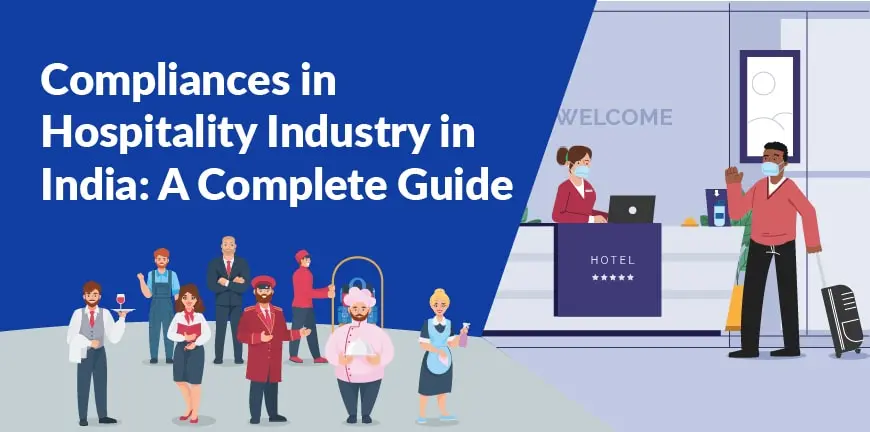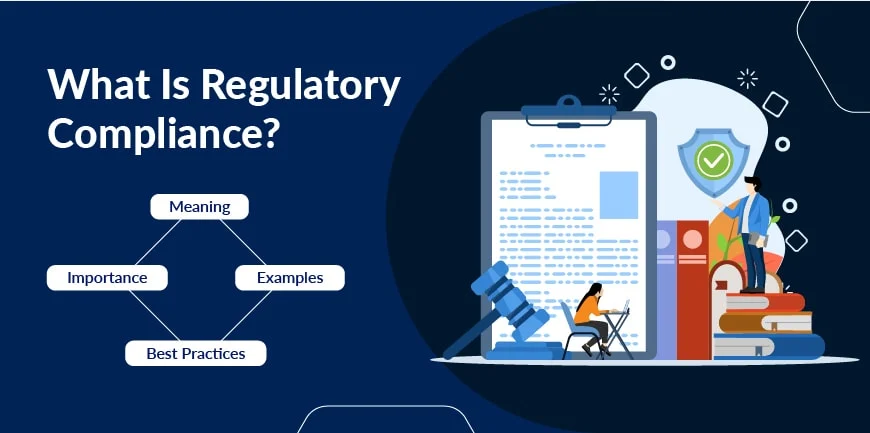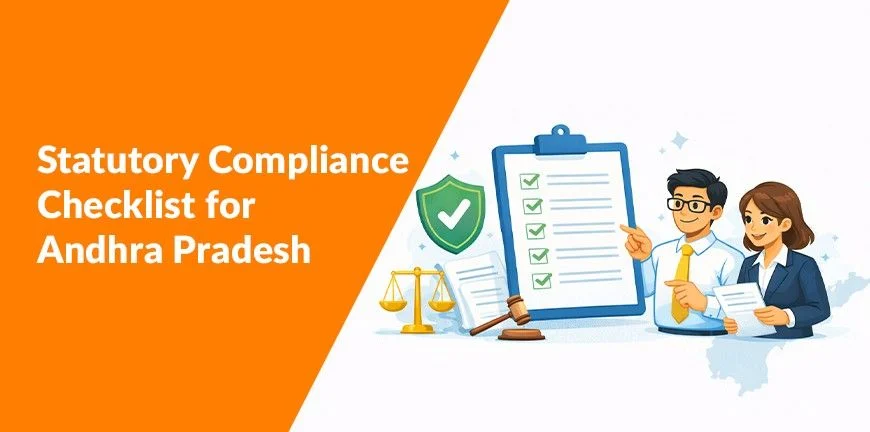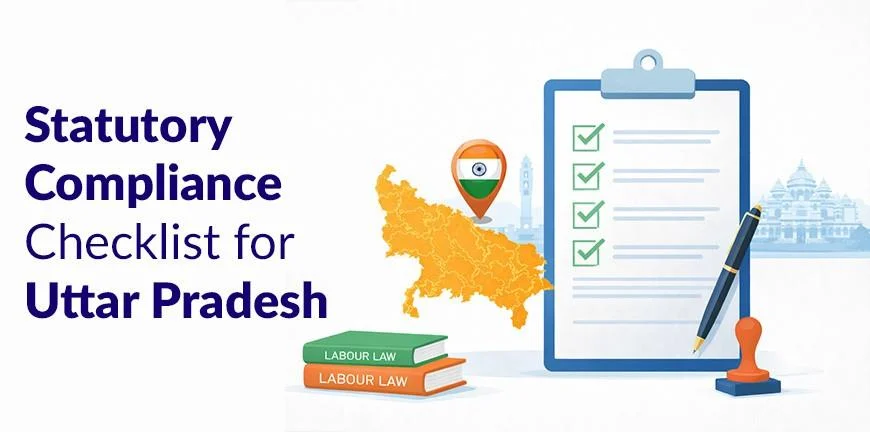
Why Organizations Must Experiment with the Truth: Embracing Gandhiji’s Principles
03/10/2024
What Is Strategic Staffing and What Are Its Advantages?
09/10/2024Ensuring compliance in Hospitality industry is quite daunting for all business owners alike. Why? The Indian hospitality industry’s landscape is so diverse, where experiences range from luxury resorts to small cafes, compliance plays a key role in making sure all the operations are run smoothly and that there is complete customer satisfaction.
These compliance guidelines serve as the backbone of hospitality industry as it prevents non-compliance leading to penalties, fines and reputational damage as well as customer dissatisfaction.
Why is compliance important in the hospitality industry?
As established in the previous section, compliance is important in the hospitality industry to avoid fines and protecting employees as well as customer interest. For example, health and safety regulations are essential to ensure prevention of injuries to customers as well as the staff, from a legal standpoint.
Keeping compliance is extremely important in order to form a trustworthy relationship with your customers, especially in today’s time where everyone is aware and are mindful of ethical and sustainable business practices. When your organization is compliant of with these regulations it demonstrates your commitment to compliance with the best practices and builds customer loyalty.
Who is responsible for hospitality compliance?
Maintaining compliance is not a one-man responsibility, each and every member has to take part! It’s up to everyone in the organization to understand and educate others on keeping compliance rules and regulations. Whether it’s a waiter serving food or a chef preparing food, each and every individual has a responsibility to follow certain rules and regulations.
Areas of compliance in hospitality industry
Every hospitality industry will have distinct rules and regulations to follow that is relevant to their industry in order to keep compliance. Failing compliance can lead to fines and penalties, legal implications and damage to your reputation. Some of the mandatory licences which ensure compliance in the hospitality industry are-
- FSSAI license
- Bar license
- Liquor license
- Health/Trade license
- Eating house license
- Approval under catering establishments Act
- GST registrations and approvals
- NOC from the Fire Department
- Approvals/license under the Contract Labour Act
- Approvals/license under the Provident Fund Act
Some of the key areas of compliance to consider within hospitality business is as follows:
1. Food Safety
If you are in the food industry, meaning you deal with handling, preparing or selling food, there are certain acts you must comply with.
The Food Safety and Standards Act, 2006, outlines several instances where an organization must take necessary actions to avoid legal penalties, such as:
- operating a business without obtaining the required FSSAI License.
- selling sub-standard food products that do not meet quality standards.
- distributing misbranded food items.
- failing to maintain hygiene and sanitary conditions during food processing.
2. Uphold fair employment practices
When a client or customer is happy with their service experience, there isn’t just one person behind this, there is an entire team that has ensured compliance with labour laws. When employers make sure they disburse timely, accurate salaries and are following the right employment practices the result is a happy workforce, which will in turn be a productive one. While employment
3. Prioritize health and safety of employees
One of the most important compliances to follow in the hospitality industry is occupational health and safety regulations, to safeguard the health and safety of all employees alike, creating an environment that is both productive and secure.
4. Maintenance of hygiene standards in food and beverages
The food and beverages vertical in the hospitality industry must ensure the right regulatory standards whilst serving or preparing food and beverages. It would help to provide a labelling with all the ingredients that have been used in the process of preparing the particular beverage or food item and maintain transparency. This will help the customers make an informed choice.
Another responsibility in the industry involves the governance of alcohol licensing and serving of spirits, maintaining the right balance between hospitality and compliance with the laws.
5. Being responsible of the environment
As part of the hospitality industry and a responsible business owner, you must be aware of the environment and its preservation. Following sustainable practices must be part of your everyday business operations. Efficient disposing, recycling and minimizing the carbon footprint are a few to name. You must follow energy efficient practices that not only help save the environment but also is extremely cost effective.
6. Accurate financial planning and adherence with tax regulations
Understanding and adhering to financial compliances in the hospitality industry could get tricky as its complex and tedious. Navigating the complexities of the newly introduced Goods and Services tax (GST) isn’t an easy feat and requires proper professional assistance. Your auditor or third-party compliance services provider must ensure complete financial transparency with appropriate reporting, auditing and accountability highlighting your commitment to ethical financial practices.
7. Adherence to local regulations maintaining peace among the community
As a hospitality industry, it is sometimes possible that your daily operation may cause noise and disturb the neighbours and community. With the right noise control measures and adherence to local laws, not only can you serve the community or your clients but also maintain peace in the surrounding.
8. Ensuring high quality and hygiene standards
The hospitality industry is all about maintaining the hygiene and cleanliness of the place, and this is non-negotiable. Customers not only look forward to a hygienic clean environment but also want to feel safe. So, it’s imperative to follow relevant rules and regulatory compliance standards to ensure cleanliness and safety and help your customers have a delightful experience.
While these are some of the key area considerations, there could be others, depending on your business. But, in short, adherence to all of these above, as per relevance is essential for seamless business operations and avoidance of penalties and fines.
What are the Challenges in Hospitality Compliance?
There are three main challenges when it comes to compliance in the hospitality industry. Businesses must be tactful navigating through these and maintain seamless business operations.
1. Employment law
In the hospitality industry there is usually a large and diverse workforce employed across various verticals of their business. From varying regulations on wages, overtime and employee rights across authorities, it’s an extremely challenging task for businesses to stay updated with the employment law and follow the same to the tee.
2. Adherence to food and Safety Regulations
As a hospitality industry business owner, ensuring top- notch food quality by adhering to food and safety regulations is of utmost importance. However, this can get tricky if your business is operating in multiple locations and has a complex supply chain process. Foodborne illness outbreaks are common than you think and can happen at any point of time which is why you must follow the standard protocols and the relevant rules and regulations.
3. Contract Law
Contracts are the soul of hospitality industry as it governs relationships with so many people like the suppliers, vendors and customers. A contractual agreement in place can help avoid any disputes and maintain a harmonious, fruitful relationship.
How to ensure compliance in the hospitality industry?
Ensuring compliance in the hospitality industry may not be as hard as you make it to be, if you follow certain standard rules.
- Understand and follow the regulatory requirements in areas like health and safety, labour laws, licensing, data protection and environmental impact.
- Seek legal guidance from professionals who specialise in hospitality law.
- Obtain and secure all the necessary permits and licences and keep track of their expiration dates.
- Make health and safety a priority and abide by the relevant rules and regulations
- Ensure that your premises are accessible to all, including the disabled and facilitate their needs.
- Stay compliant with local and national labour laws that govern wages, benefits, overtime etc of employees.
- Implement robust data protection measures and maintain the privacy.
- Incorporate environmentally sustainable practices and try your best to preserve your surroundings.
- Obtain and maintain the necessary alcohol and entertainment licencing if relevant to your business
- Prepare for any security or emergency and have the right plan in place to avoid chaos.
- Conduct regular audits. Review your updated policies and incorporate those changes diligently into your operations.
Ensuring compliance in the hospitality industry through a third-party provider like Alp Consulting can help you maintain ambitious standards of legal adherence, customer safety, and operational efficiency.
As one of the most experience compliance service providers we bring specialized expertise and resources, helping businesses navigate complex regulatory landscapes and implement best practices. With us as your compliance partners, you can focus on core business operations and deliver exceptional guest experiences while we manage compliance requirements. Our robust compliance will be strategic investment in the long-term success and sustainability of hospitality operations for your business.
Contact Us For Business Enquiry

Hariharan Iyer
Hariharan Iyer is the Vice President – Operations at ALP Consulting, bringing over 40+ years of experience in HR outsourcing and labour law compliance. He leads end-to-end HRO operations, ensuring process efficiency, statutory compliance, and seamless service delivery for clients across industries. With a strong background in labour law governance and workforce management, Hariharan plays a key role in driving operational excellence and compliance-led HR solutions at ALP Consulting.




